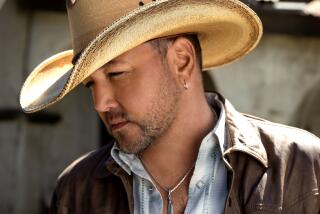THE BLAKES SOUND LIKE OLD TIMES
- Share via
Where many artists would be insulted to be called throwbacks, folk musicians Norman and Nancy Blake take it as a compliment. They don’t just play music with roots in old traditions--they live a life that sounds more appropriate to performers from some past age.
The Blakes are modern-day troubadours, traveling as much as 12,000 miles a year by car; Norman hasn’t taken a plane in 14 years. They play their acoustic string music in settings ranging from small church halls to large outdoor festivals, plus folk rooms like McCabe’s in Santa Monica, where they’ll perform Saturday.
Norman is a masterful guitar flat-picker and dobro and mandolin player with an impressive resume of studio credits acquired in Nashville during the ‘60s and early ‘70s.
Along the way he served a lengthy stint in Johnny Cash’s studio and television band and had a prominent role on Bob Dylan’s ground-breaking “Nashville Skyline” album.
In 1971, he met Nancy Scott, an accomplished performer on numerous stringed instruments (including guitar, mandolin and cello) who was also based in Nashville. Married in 1975, they’ve been working as a team ever since, focusing on music Norman describes as “old-time country with some original material.”
Their rustic music and performing life is further underscored by their home life: They spend their non-touring half of every year in Rising Fawn, Ga., a “wide spot in the road” with a population of 250. If it sounds like the Blakes exist in a world apart, they wouldn’t have it any other way.
“I just don’t subscribe to a lot of values in our society,” Norman Blake said. “I don’t want to plug into that reality.”
The one aspect of modern life that’s most bothersome to him is the disappearance of regional distinctions in American society.
“I’m not against people still having ethnic pockets and ways of speaking,” he said, his drawl solid proof of his regional origins--he was born in 1938 in Chattanooga, Tenn., 25 miles to the north of Rising Fawn. “I’m against this homogenous culture we seem to be heading for.”
This, in part, is what led the Blakes to leave the Nashville environment and its citified country music for the rural ways of Rising Fawn and the purer music they pursue.
“It just seemed like it was a natural evolvement for me,” Blake said. “I wanted to go back and play some of the music I heard as a child. I started playing when I was about 11 or 12 years old just through hearing the music on the radio and old 78 (r.p.m.) records and from a few local musicians.”
The Blakes’ music isn’t anywhere near as archaic as Blake might let on when he aligns himself with a tradition that “probably runs from the 1930s (back) to the 10th Century.” Sometimes it even comes off as downright progressive, with Nancy’s cello adding a distinctive, almost chamberlike dimension. This is especially evident in the music of the Rising Fawn String Ensemble, an expanded lineup the duo sometimes employs.
Norman, however, resists suggestions that what they do is somehow above and beyond their traditional inspirations.
“A lot of people try to hang the ‘classical music’ tag on it because we use that instrument,” he said. “You go back and a lot of old string bands used cello as their bass instrument.”
Reserved and a bit shy, Norman seemed somewhat reluctant in his role as a crusader, but he said circumstances have made it necessary that he act as one.
“Anyone who plays acoustic music and has to fight all the battles to do it damn well better be,” he said. “You got to have a lot of fortitude to do that. It’s an uphill battle when all it takes is one air conditioner to drown you out.”
More to Read
The biggest entertainment stories
Get our big stories about Hollywood, film, television, music, arts, culture and more right in your inbox as soon as they publish.
You may occasionally receive promotional content from the Los Angeles Times.








